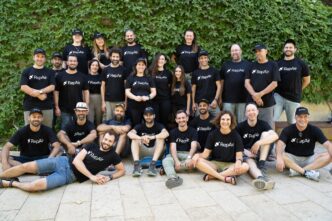Dennis Xu, a serial tech startup founder, is no stranger to innovation — but he’s the first to admit he’s not a programmer. After co-founding Mem, an AI note-taking platform that was among the earliest OpenAI-backed startups, Xu is now turning his attention to an even bigger vision: democratizing app development for non-coders. His new company, Adaptive Computer, aims to completely rethink personal computing — not through hardware, but through software.
The idea is to let everyday users build fully functional apps just by typing a text prompt. No technical knowledge, no coding — just describe what you want, and the platform builds it.
To kick things off, Adaptive has raised a $7 million seed round. The funding was led by Pebblebed, a seed-stage VC firm launched by ex-Stripe AI engineer Pamela Vagata and former Slack architect Keith Adams. Other backers include Conviction, Weekend Fund, Anti Fund (from Jake Paul), Roblox CEO Dave Baszucki, and more.
Xu, who stepped away from Mem in 2023, says that before large language models (LLMs), turning an idea into reality meant navigating through multiple layers of communication — working with designers, who then collaborated with engineers. Now, thanks to LLMs, he believes it’s possible to put a tool in everyone’s hands to build exactly what they envision — with no need to code or manage complex workflows.
Though the company name may suggest otherwise, Adaptive Computer isn’t building physical machines. Instead, it’s focused on web apps. But these aren’t prototypes or static pages — they’re real, fully functional apps that handle backend setup, database creation, authentication, file handling, payment processing through Stripe, and even include AI-powered tools like image generation, speech synthesis, content analysis, and online research.
A Personal Operating System for Everyone
Xu and his co-founder, Mike Soylu, have introduced their flagship product, ac1, which is currently in alpha testing. In a demo, Xu was asked to build a bicycle ride log app. Within about a minute, Adaptive generated a JavaScript-based web app that included backend logic, ride sorting, total distance tracking, and comparative analysis — all with no user input beyond the original prompt.
While it didn’t connect to external services like fitness trackers, it created a shareable, fully operational site where others could log their rides independently. It also didn’t expose the creator’s personal data, showing thoughtful design around privacy from the start.
Xu emphasizes that this tool isn’t just about simplifying programming — it’s about enabling people with no tech background at all. Unlike existing tools such as Replit or Lovable, which were initially designed for developers and only later adapted for general use, Adaptive was built from the ground up for everyday creators.
“Try building an AI-powered tool on those platforms,” Xu says, “and you’ll quickly run into roadblocks like having to input your own API keys.” That’s exactly the kind of barrier Adaptive seeks to remove. Its vision is for users to create tools that help not just themselves, but others — with minimal friction.
What makes Adaptive different is also its modularity. Apps created on the platform can interact with each other. For example, if you build a file-hosting app, another app can tap into that data without needing complex integrations. Xu describes this more like a personal operating system than a collection of standalone tools.
Early adopters have already created a range of useful applications — including AI-generated storytelling apps, e-commerce sites for selling coffee beans, and text-to-speech tools for reading PDFs. The platform is already proving its versatility, even in its limited alpha state.
Adaptive offers three subscription plans: a free tier with limited functionality, a $20 per month plan for casual users, and a $100 per month “Creator/Pro” plan for more serious builders.
While competitors like Replit boast user bases in the tens of millions and Swedish startup Lovable claims $10 million in ARR just 60 days after launch, Xu is confident Adaptive fills a different need. It’s not just about making development easier — it’s about empowering people who never thought building an app was possible.













